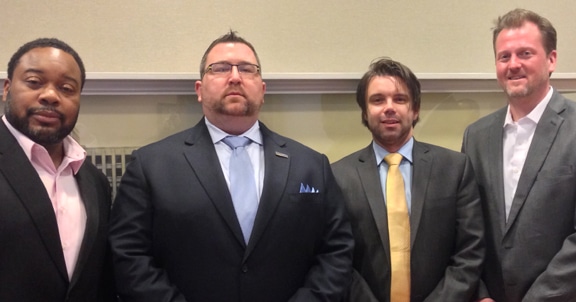Forty-two people, including the train engineer, were injured when their SEPTA train crashed into an empty, stopped train inside the 69th Street Transportation Center in Upper Darby, Pa., shortly after midnight, Tuesday, Aug. 22.
In a statement, SEPTA said that none of the injuries appeared to be life threatening. The train was carrying 41 passengers and the train operator when the crash occurred.
The National Transportation Safety Board (NTSB) has dispatched personnel to the scene to investigate the cause of the accident.
Read more from Philly.com.
Tag: SEPTA
According to 6abc.com, a SEPTA commuter train collision in Upper Darby, Penn. resulted in four injuries, including the train engineer, who was reported to be in critical condition. Names of the injured have not been released; NTSB investigators are on site. Read the complete story here.
In a press release, Southeastern Pennsylvania Transportation Authority (SEPTA) signed an Implementing Memorandum of Understanding (IMOU) with SMART TD Local 61, BLET and the Federal Railroad Administration (FRA) for the Confidential Close Call Reporting System (C3RS). Below is SEPTA’s press release:
PHILADELPHIA (December 12, 2016) – SEPTA, the Brotherhood of Locomotive Engineers and Trainmen (BLET), SMART United Transportation Union-Local 61 (SMART-UTU) and the Federal Railroad Administration (FRA) today signed an Implementing Memorandum of Understanding (IMOU) for the Confidential Close Call Reporting System (C3RS).
As a C3RS site, SEPTA’s railroad conductors and engineers will be able to anonymously report near misses and unsafe conditions without fear of repercussion. SEPTA joins Amtrak, New Jersey Transit, Metra (Chicago), MBTA/Keolis (Boston), Long Island Railroad, Metro North and Strasburg Railroad (Strasburg, Pa) as carriers with C3RS IMOUs.
“Building a strong safety culture is a key organizational goal for SEPTA. We are always exploring ways to expand and enhance our programs,” said SEPTA General Manager Jeffrey Knueppel. “As a C3RS site, we will be made aware of situations that we might not have been previously alerted to so that we can take action to prevent accidents and protect our employees and passengers.”
Under the C3RS system, SEPTA’s engineers and conductors will be able to submit a safety problem or close call online or through U.S. mail to the National Aeronautics and Space Administration (NASA). NASA, acting as an independent third party federal agency, gathers and analyzes all data for C3RS, removes employees’ names and contact information (these are required for the NASA portion of the investigation) and then returns the reports to a peer review team comprised of SEPTA managers, the unions and FRA for review and action.
“We are looking for conditions or close calls other than accidents or injuries that might not otherwise be reported to the FRA,” said SEPTA Assistant General Manager of System Safety Scott Sauer. “We are asking employees to report events that we might not otherwise know about, the warning signs and precursors that could lead to major safety risks and accidents.”
“C3RS, along with PTC [Positive Train Control] implementation, which is nearly complete on SEPTA territory, will greatly improve the safety of our system,” Knueppel said.
“Previously, employees may have been hesitant to report a close call, fearing disciplinary action for themselves or colleagues,” said Sauer. “When NASA returns the report to the peer review team, it is completely scrubbed of any employee information. We never know who submitted the information to NASA.”
For more information on C3RS, click here.

Since the Federal Railroad Administration (FRA) mandated in 2008 that all railroads operating in the U.S.install PTC by Dec. 31, 2015, Amtrak, SEPTA and a few other railroads have been working to install the system by the original deadline. However, Amtrak and SEPTA are in the minority. Most railroads have delayed the installation of this long-overdue safety technology.

PTC technology is designed to stop or slow-down a speeding train and is expected to bring an element of safety to the railroads previously unheard of. It is speculated that if the technology had been operational during the Amtrak crash near Philadelphia earlier this year, then the derailment possibly would not have happened.
Despite this accident and others, the railroads have drug their feet in having the technology installed, claiming they have not had enough time to install the system, make it operational and that the cost of the technology is too high. The Northeast Corridor is now one of the few areas where PTC is operational in the United States.
Read more from Philly.com.

The Metropolitan Transportation Authority’s (MTA) New York City Transit/MTA Bus Co. tops this year’s list with 5,759 total vehicles. Showing some movement this year, the Los Angeles County Metropolitan Transportation Authority (2,378), New Jersey Transit (2,233), Seattle’s King County Metro Transit (1,882) and the Toronto Transit Commission (1,869) round out this year’s top five, which collectively totals 14,121 vehicles, or 21 percent of this year’s overall 66,056 total vehicles — down slightly compared to 2014, although last year’s list ranked the Top 110 bus fleets.
Click here to read the full results of the survey.
Read more from Metro Magazine.

Philadelphia officials estimate 1.5 million to 2 million visitors will descend on the city for the pope’s Sept. 26-27 visit, which will coincide with the World Meeting of Families, a conference organized every three years by the Holy See’s Pontifical Council for the Family.
Although the city and its affiliated agencies have prepared for many major public-gatherings in the past — Philadelphia hosted the Republican National Convention in 2000 and will host the Democratic National Convention in 2016, for example — SEPTA’s planning for the papal visit is unprecedented, says Deputy General Manager Jeff Knueppel.
Read more from Progressive Railroading.

According to a report from the Federal Railroad Administration (FRA) required by Congress, safety advocates started calling for the nation-wide implementation seven years ago.
“Positive Train Control is the most significant advancement in rail safety technology in more than a century,” U.S. Transportation Secretary Anthony Foxx said in the report. “Simply put: it prevents accidents and saves lives, which is exactly what we seek to do at The Department of Transportation every single day. We will continue to do everything in our power to help railroads install this technology.”
Read more from NJ.com.

Transportation Division Vice President John Lesniewski, who assisted with negotiations, expressed his gratitude to General Chairperson Bernard Norwood, as well as his negotiating committee consisting of Vice General Chairpersons A. J. Bright, Michael Stevens, Raymond Boyer and General Secretary Nelson Pagan for their professionalism, tenacity and commitment to finding an equitable agreement in a timely manner for the benefit of our Local 61 members.
The Southeastern Pennsylvania Transportation Authority (SEPTA) is a metropolitan transportation authority that operates various forms of public transit—bus, subway and elevated rail, commuter rail, light rail, and electric trolley bus—that serves 3.9 million people in and around Philadelphia. General Chairperson Norwood and his committee represent approximately 350 active rail members on this property.

The contract, which is retroactive to April 1, 2014, and extends until Nov. 18, 2016, covers bus operators, trolley operators and conductors and operators on the Norristown High Speed Line. They are members of Transportation Division Local 1594 at Upper Darby, Pa.
The deal affects more than 350 members and was ratified by 61 percent of eligible voters who participated in the balloting process, said Transportation Division Bus Vice President Calvin Studivant, who assisted with the negotiations.
Wage adjustments include a two-percent increase following ratification of the agreement and a three-percent increase effective Jan. 10, 2016.
A side letter to the agreement also calls for the authority to establish a “work zone committee” to address work safety issues as they pertain to the transportation department.
Studivant congratulates General Chairperson and Local President Waverly Harris, former Vice Local Chairperson Brian Caldwell, and Vice Local Chairpersons Curtis Fulmore, Dave Stinsman, Eric Goodwin and Anthony Petty for their arduous efforts in obtaining this agreement.
“A lot of hours were dedicated to finalizing this collective bargaining agreement. I commend the local officers for their diligence and preparation and the membership that participated in the ratification vote,” Studivant said.
The Federal Railroad Administration Feb. 10 will hold a public hearing before ruling on a waiver request by Southeastern Pennsylvania Metropolitan Transportation Authority (SEPTA)?to extend its current waiver of hours of service provisions for on duty points.
SEPTA has asked FRA to renew a waiver that the transit agency has had in effect for the past two years.
The rule in question involves the time employees spend traveling from home to start work somewhere other than their usual designated location. At issue is whether this time is considered as part of their hours of service.
In its written comments to FRA prior to this hearing, the SMART? Transportation Division said it “opposes SEPTA’s request because granting it would reduce much needed rest periods for operating employees and will put the traveling public and SEPTA employees at increased risk of fatigue related accidents.
“Fatigue related accidents are a particular concern because of SEPTA’s claim that it serves 3.8 million people and is the sixth largest U.S. commuter rail system, averaging approximately 127,000 daily weekday riders. Given the large amount of passengers that SEPTA carries, granting this waiver request will place crew members and the public in increased likelihood of fatigue-related accidents to help solve what are essentially crew scheduling issues.
“According to SEPTA, only seven assignments start at a location different than the regular reporting location for extra board employees. We estimate this waiver is a fix for less than five percent of SEPTA’s total jobs. Again, this is a crew scheduling issue and in no way justifies a waiver from minimal hours of service rules. If SEPTA needs help in managing crew availability and scheduling concerns, we would be happy to assist them.
“The SMART Transportation Division believes deadhead transportation to an on duty assignment should be counted as time on duty for SEPTA operations, just as it is counted as on duty for every other railroad in the country. The reason is simple, whether an employee is working on an assignment or driving to an assignment, they are still not receiving needed rest. There is no guarantee SEPTA will keep this system if given this waiver. It would clearly benefit SEPTA to remove it if this waiver is approved.
“The Metro-North accident in November 2013, resulting in the death of four people, was found to be caused by an engineer that ‘nodded off’ before the accident. The engineer had recently changed from an afternoon to morning shift, which could have impacted his internal clock. This should have been a wake-up call for SEPTA.
“In the interest of public safety and in the interest of preserving minimal hours of service standards, the SMART Transportation Division asks that the FRA decline this waiver request.
“In its petition, SEPTA states it has the support of the SMART Transportation Division for this waiver. This claim, along with much of SEPTA’s claims in this request, is inaccurate. We oppose this waiver request and ask that it be denied in its entirety.”
Transportation Division Pennsylvania Paul Pokrowka attended the Feb. 10 hearing.
“In October 2014, I attended SEPTA Local 61’s meeting and the membership unanimously asked me to fight this issue. This is of major concern for us due to safety of our members and the riding public. Fatigue related accidents are a huge concern to the Pennsylvania Legislative Board. SEPTA has chosen to spend their resources circumventing the system rather than working with this office for a proper resolution,” Pokrowka said.
The public hearing was scheduled for 10 a.m. at Baldwin Tower at 1510 Chester Pike in Crum Lynne, Pa.
Local 61 Legislative Rep. Keith English, Pokrowka, Local 1373 Legislative Rep. Kyle Brightbill and SEPTA General Committee of Adjustment Vice Chairperson Michael Stevens attend the Feb. 10 waiver request hearing before the Federal Railroad Administration.
